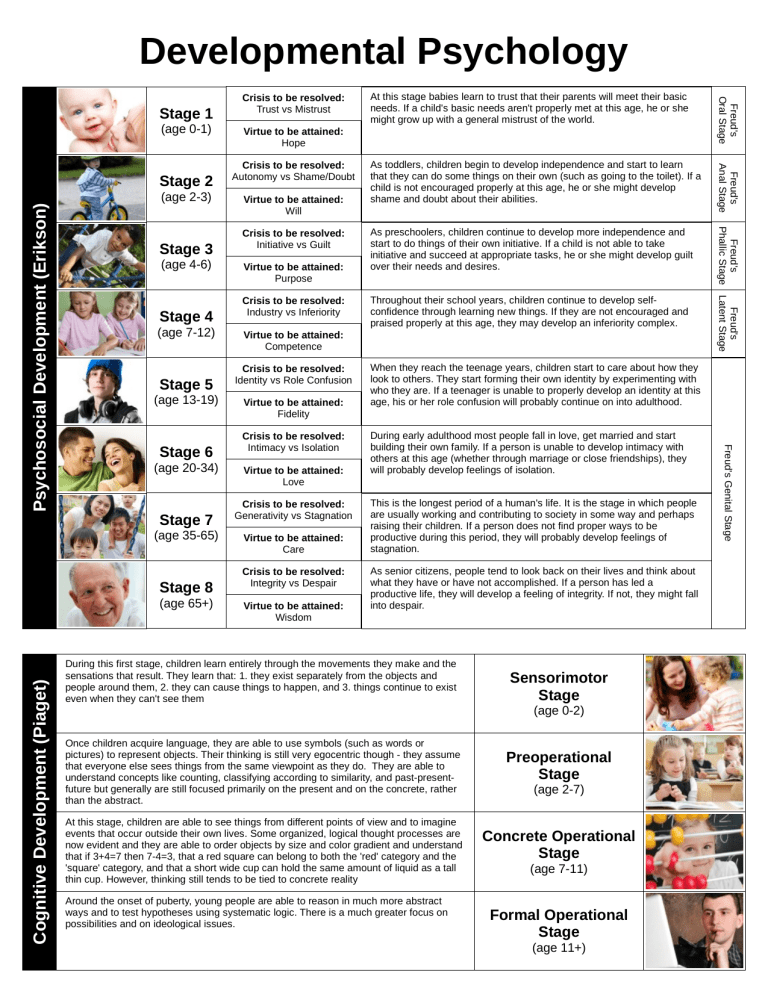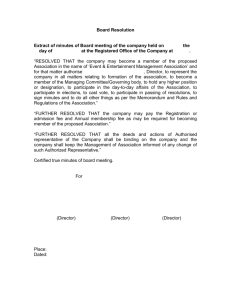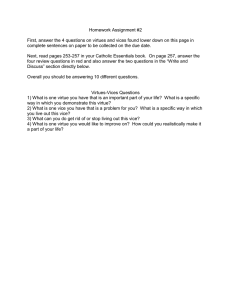
Developmental Psychology (age 0-1) (age 4-6) Stage 4 (age 7-12) Stage 5 (age 13-19) Stage 6 (age 20-34) Stage 7 (age 35-65) Stage 8 Cognitive Development (Piaget) (age 65+) Crisis to be resolved: Autonomy vs Shame/Doubt Virtue to be attained: Will Crisis to be resolved: Initiative vs Guilt Virtue to be attained: Purpose Crisis to be resolved: Industry vs Inferiority As toddlers, children begin to develop independence and start to learn that they can do some things on their own (such as going to the toilet). If a child is not encouraged properly at this age, he or she might develop shame and doubt about their abilities. As preschoolers, children continue to develop more independence and start to do things of their own initiative. If a child is not able to take initiative and succeed at appropriate tasks, he or she might develop guilt over their needs and desires. Throughout their school years, children continue to develop selfconfidence through learning new things. If they are not encouraged and praised properly at this age, they may develop an inferiority complex. Virtue to be attained: Competence Crisis to be resolved: Identity vs Role Confusion Virtue to be attained: Fidelity Crisis to be resolved: Intimacy vs Isolation Virtue to be attained: Love Crisis to be resolved: Generativity vs Stagnation Virtue to be attained: Care Crisis to be resolved: Integrity vs Despair Virtue to be attained: Wisdom When they reach the teenage years, children start to care about how they look to others. They start forming their own identity by experimenting with who they are. If a teenager is unable to properly develop an identity at this age, his or her role confusion will probably continue on into adulthood. During early adulthood most people fall in love, get married and start building their own family. If a person is unable to develop intimacy with others at this age (whether through marriage or close friendships), they will probably develop feelings of isolation. This is the longest period of a human's life. It is the stage in which people are usually working and contributing to society in some way and perhaps raising their children. If a person does not find proper ways to be productive during this period, they will probably develop feelings of stagnation. As senior citizens, people tend to look back on their lives and think about what they have or have not accomplished. If a person has led a productive life, they will develop a feeling of integrity. If not, they might fall into despair. During this first stage, children learn entirely through the movements they make and the sensations that result. They learn that: 1. they exist separately from the objects and people around them, 2. they can cause things to happen, and 3. things continue to exist even when they can't see them Once children acquire language, they are able to use symbols (such as words or pictures) to represent objects. Their thinking is still very egocentric though - they assume that everyone else sees things from the same viewpoint as they do. They are able to understand concepts like counting, classifying according to similarity, and past-presentfuture but generally are still focused primarily on the present and on the concrete, rather than the abstract. At this stage, children are able to see things from different points of view and to imagine events that occur outside their own lives. Some organized, logical thought processes are now evident and they are able to order objects by size and color gradient and understand that if 3+4=7 then 7-4=3, that a red square can belong to both the 'red' category and the 'square' category, and that a short wide cup can hold the same amount of liquid as a tall thin cup. However, thinking still tends to be tied to concrete reality Around the onset of puberty, young people are able to reason in much more abstract ways and to test hypotheses using systematic logic. There is a much greater focus on possibilities and on ideological issues. Sensorimotor Stage (age 0-2) Preoperational Stage (age 2-7) Concrete Operational Stage (age 7-11) Formal Operational Stage (age 11+) Freud's Genital Stage Psychosocial Development (Erikson) Stage 3 Virtue to be attained: Hope Freud's Freud's Phallic Stage Latent Stage (age 2-3) At this stage babies learn to trust that their parents will meet their basic needs. If a child's basic needs aren't properly met at this age, he or she might grow up with a general mistrust of the world. Freud's Anal Stage Stage 2 Crisis to be resolved: Trust vs Mistrust Freud's Oral Stage Stage 1 Pre-Conventional Morality Obedience or Punishment Orientation Stage 2 Self-Interest Orientation Conventional Morality Stage 3 Social Conformity Orientation Post-Conventional Morality Moral Development (Kohlberg) Hierarchy of Needs (Maslow) Stage 1 Stage 5 Stage 4 Law and Order Orientation Social Contract Orientation Stage 6 Universal Ethics Orientation Self-Actualization Needs Love & Belonging Needs Physiological Needs As children grow older, they begin to see that other people have their own goals and preferences and that often there is room for negotiation. Decisions are made based on the principle of "What's in it for me?" For example, an older child might reason: "If I do what mom or dad wants me to do, they will reward me. Therefore I will do it." By adolescence, most individuals have developed to this stage. There is a sense of what "good boys" and "nice girls" do and the emphasis is on living up to social expectations and norms because of how they impact day-to-day relationships. By the time individuals reach adulthood, they usually consider society as a whole when making judgements The focus is on maintaining law and order by following the rules, doing one's duty and respecting authority. At this stage, people understand that there are differing opinions out there on what is right and wrong and that laws are really just a social contract based on majority decision and inevitable compromise. People at this stage sometimes disobey rules if they find them to be inconsistent with their personal values and will also argue for certain laws to be changed if they are no longer "working". Our modern democracies are based on the reasoning of Stage 5. Few people operate at this stage all the time. It is based on abstract reasoning and the ability to put oneself in other people's shoes. At this stage, people have a principled conscience and will follow universal ethical principles regardless of what the official laws and rules are. achieving one's full potential confidence, respect recognition, status Esteem Needs Safety Needs This is the stage that all young children start at (and a few adults remain in). Rules are seen as being fixed and absolute. Obeying the rules is important because it means avoiding punishment. friendship, family, Intimacy job security, financial resources, good health air, water, food, warmth, sleep All images are used under license from Shutterstock Images LLC. See www.shutterstock.com for more information. Created by Matt Baker, UsefulCharts.com Downloaded via TeachersPayTeachers.com


